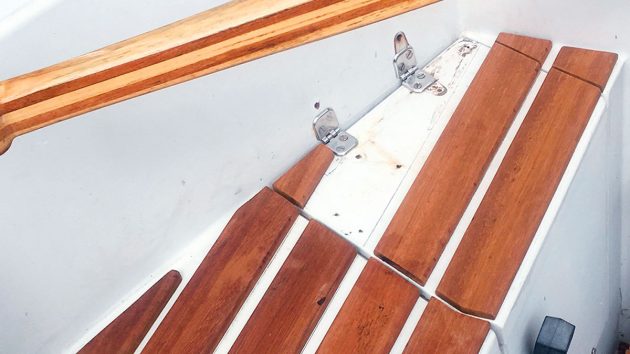PBO reader Les Broughton is struggling to glue his teak planking to the fibreglass in his cockpit. Boat builder Lyndon March has the answer
I’ve tried to replace the teak planking in the cockpit on my Sadler 32.
The original teak planking was held in place with screws and plugs, but when I replaced the teak I tried to glue it in place as I thought it would give a better finish.

Les has used several different types of glue but the teak decking still comes unstuck. Credit: Les Broughton
I’ve tried several different types of glue but none seem to hold for long and just come up leaving the glue stuck to the wood or the fibreglass.
Can you recommend a glue that works?
Les Broughton
Lyndon March replies:
When glueing down any timber to fibreglass it’s a great idea where possible to limit or completely remove fastenings – not only are they often unnecessary but a prime source of leaks in what should be a watertight deck.
There are only two options here: a bedding adhesive such as Sikaflex 298, or West System Epoxy 105 and 205.
While a bedding adhesive will be best for those who might have a slightly more flexible deck and plan on using caulk, epoxy is brilliant for a fastening-free finish and large single sections.
Preparation is the key.
It’s important to make sure the fibreglass you’re glueing to is thoroughly sanded and clean.
Continues below…
Boat wood: a complete guide for yacht owners
Boatbuilder and finisher Lyndon March explains which types of wood work best for different repairs and modifications on board
Best corrosion protection method? Ask the experts
Bob Williams writes: “During a recent chat at my sailing club questions were discussed about anodes, galvanic corrosion and earthing,…
How should I look after my fuel to beat diesel bug?
Ali Wood gets some bug-beating advice from Marine 16’s Peter Weide and learns why modern diesel requires more attention than…
Cleaning rusty engine innards? Ask the experts
Alan Carter from Dunfermline writes: “I’m on the way to solving the problem of rusty innards in my old boat…
This also applies to the underside of the timber: acetone is brilliant for making sure the surface is clear of grim and dirt.
Once the cleaning solution has dried, make sure your timber fits, not only in length and width but in terms of camber.
Decks aren’t always dead flat and timber might require shaping on the underside.
Thick boards of timber will usually try and straighten away from cambered decks, especially without fastenings.
If using epoxy apply a liberal coating neat onto the underside of the timber.
Onto the deck area apply epoxy thickened with 410B Microlight filler (a notched spreader allows for an even thickness of this).
Place timber on top to allow correct spacing then place weights on top of timber or screws through caulking seams with washers on top to make sure it all dries bonded down tight.
You can’t have too much downward pressure in this situation.
Wipe any edges, dribbles and spills off the gel coat before it all dries.
Enjoy reading What is the best way to stick down teak planking?

A subscription to Practical Boat Owner magazine costs around 40% less than the cover price.
Print and digital editions are available through Magazines Direct – where you can also find the latest deals.
PBO is packed with information to help you get the most from boat ownership – whether sail or power.
-
-
-
- Take your DIY skills to the next level with trusted advice on boat maintenance and repairs
- Impartial in-depth gear reviews
- Practical cruising tips for making the most of your time afloat
-
-
Follow us on Facebook, Instagram, TikTok and Twitter








